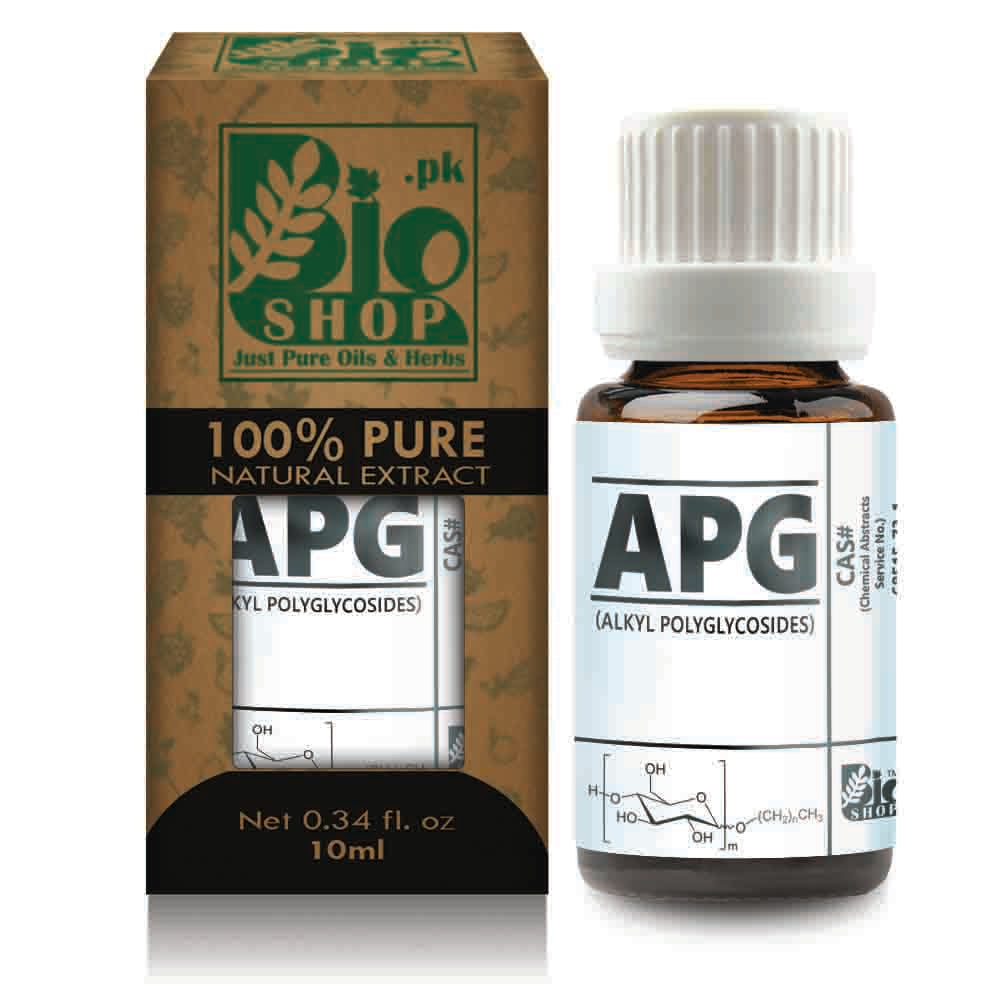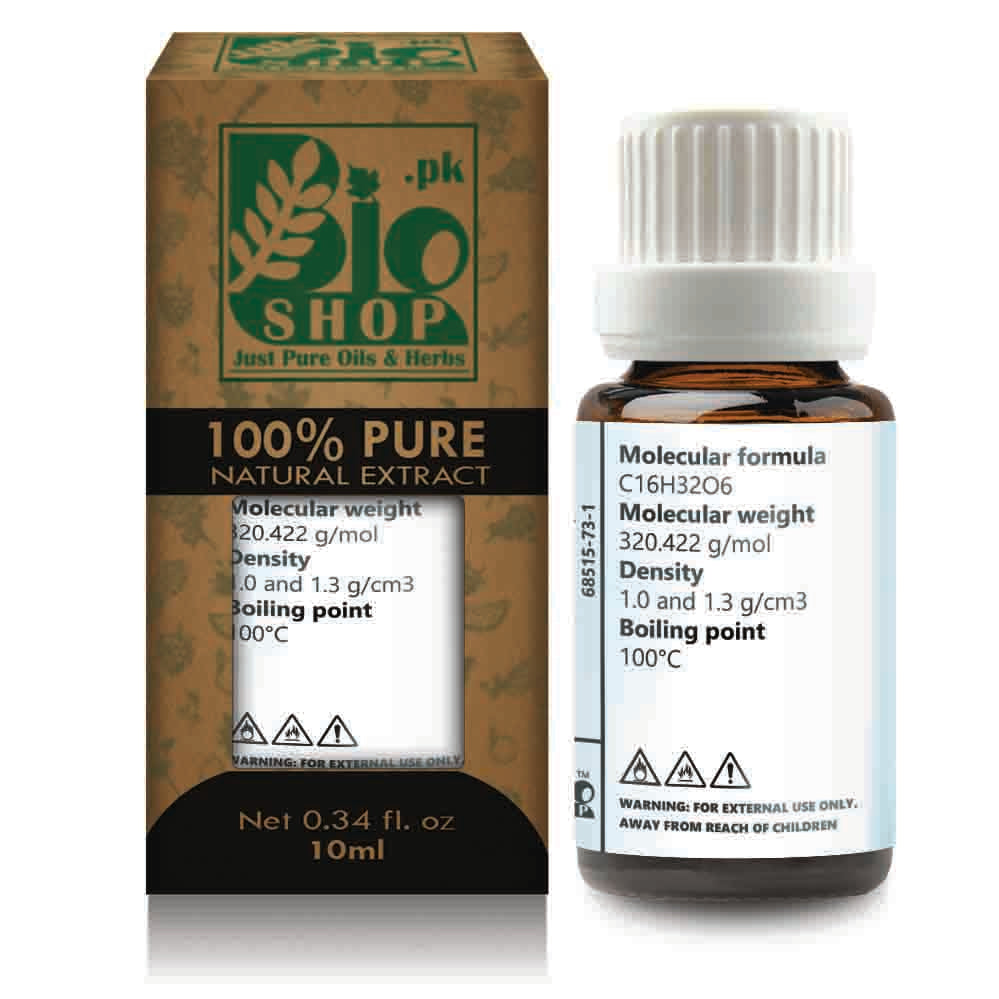Bio Shop
APG (Alkyl Polyglycosides)
APG (Alkyl Polyglycosides)
Key Functions: Acts as a mild, non-ionic surfactant offering gentle cleansing and foaming in eco-friendly and baby-safe formulations.
Couldn't load pickup availability
Explore
Information About APG (Alkyl Polyglycosides)
✅ Key Features
- 100% plant-derived from glucose and fatty alcohols
- Mild and non-irritating – ideal for sensitive skin
- Eco-friendly and biodegradable
- Compatible with anionic, cationic, and amphoteric surfactants
- Stable over wide pH range and hard water
🔬 Description
Alkyl Polyglycosides (APG) – Natural Non-Ionic Surfactant for Mild Cleansing
Alkyl Polyglycosides (APG) are a class of non-ionic surfactants produced by reacting natural glucose (from corn or sugar) with fatty alcohols (like decanol or lauryl alcohol). APGs are extremely mild, making them ideal for baby shampoos, micellar waters, facial cleansers, and eco-friendly personal care products. Despite their gentle nature, they offer good foaming, stability across a broad pH range, and compatibility with other surfactant systems, allowing you to reduce irritation while maintaining cleansing performance.
📊 Technical Data
INCI Name: Alkyl Polyglycoside
CAS Number: 68515-73-1
Solubility: Water-soluble
Add Phase: Water phase (cold or hot)
pH Stability: Stable across 3–10
Processing Temperature: Up to 70°C
Appearance: Pale yellow to clear viscous liquid
Odor: Faint characteristic
Molecular Formula: C₁₆H₃₂O₆ (varies by alkyl chain)
Molecular Weight: ~308.4 g/mol (approximate)
Flash Point: > 150°C
Density: ~1.05 g/cm³
Chemical Type: Non-ionic surfactant
Functional Groups: Ether, Glycosidic bond
Primary Cosmetic Uses: Facial cleansers, baby shampoos, sulfate-free formulas, natural
🧪 Recommended Usage
- Usage Rate: 3% – 20%
- Phase: Water phase (hot or cold processed)
- Ideal For: Micellar water, baby wash, face cleansers, green shampoo
💡 Pro Tip
🌱 For ultra-mild, sulfate-free formulas, pair APG with Lauryl Glucoside, Sodium Lauroyl Sarcosinate, or Cocamidopropyl Betaine. Add glycerin or panthenol to enhance skin hydration and post-wash comfort.
👩🔬 Skin Type Compatibility
✔️ Ideal for sensitive, dry, and baby skin
✔️ Very low irritation profile
✔️ Suitable for leave-on and rinse-off systems
🧴 Formulation Ideas
1. Baby Foaming Cleanser
Use 10% APG with chamomile extract and glycerin for a sulfate-free baby wash.
2. Gentle Face Cleanser
Combine 8% APG with Cocamidopropyl Betaine and panthenol for a pH-balanced facial foam.
3. Sulfate-Free Shampoo
Formulate 15% APG with Lauryl Glucoside and Decyl Glucoside for a gentle, effective shampoo.
4. Natural Shower Gel
Use with Aloe Vera, xanthan gum, and fragrance for a clean-label shower wash.
5. Micellar Water Base
Add 5–7% in water with mild preservatives and humectants for gentle makeup removal.
💧 Cosmetic Suitability:
Serums
☆☆☆☆☆ – Not Suitable
🟥⬜⬜⬜⬜ – Not used in leave-on systems.
Creams & Lotions
⭐☆☆☆☆ – Poor
🟥⬜⬜⬜⬜ – Not typically added to emulsions.
Toners
⭐⭐☆☆☆ – Fair
🟧🟧⬜⬜⬜ – Used in micellar water formulations.
Face Masks
⭐⭐☆☆☆ – Fair
🟧🟧⬜⬜⬜ – Only in rinse-off masks.
Cleansers
⭐⭐⭐⭐⭐ – Excellent
🟩🟩🟩🟩🟩 – Extremely mild and effective.
Hair Masks
⭐⭐☆☆☆ – Fair
🟧🟧⬜⬜⬜ – Sometimes used in pre-wash masks.
Deodorants
⭐☆☆☆☆ – Poor
🟥⬜⬜⬜⬜ – Rarely used.
Eye Creams
☆☆☆☆☆ – Not Suitable
🟥⬜⬜⬜⬜ – Not used in leave-on.
Shampoos
⭐⭐⭐⭐⭐ – Excellent
🟩🟩🟩🟩🟩 – Perfect for gentle cleansing.
Soaps
⭐⭐⭐⭐☆ – Good
🟩🟩🟩🟩⬜ – Mild addition to SLS-free soap bases.
Conditioners
⭐⭐☆☆☆ – Fair
🟧🟧⬜⬜⬜ – Can aid in cleansing conditioners.
Lip Balms
☆☆☆☆☆ – Not Suitable
🟥⬜⬜⬜⬜ – Not used.
Body Butters
☆☆☆☆☆ – Not Suitable
🟥⬜⬜⬜⬜ – Not suitable.
Ointments
☆☆☆☆☆ – Not Suitable
🟥⬜⬜⬜⬜ – Not suitable.
❓ FAQs
Q1: Is APG derived from natural sources?
A1: Yes, it's made from plant-based sugars and coconut fatty alcohols.
Q2: Is it safe for daily facial use?
A2: Absolutely. It’s ideal for sensitive and daily-use products.
Q3: Does it foam well on its own?
A3: Moderate foam on its own; best when blended with foam boosters.
📂 Documentation
Upon request, we will provide.
Where Can You Safely Use APG (Alkyl Polyglycosides)
Discover how APG (Alkyl Polyglycosides) performs across different products — rated for safety, stability, and effectiveness.




